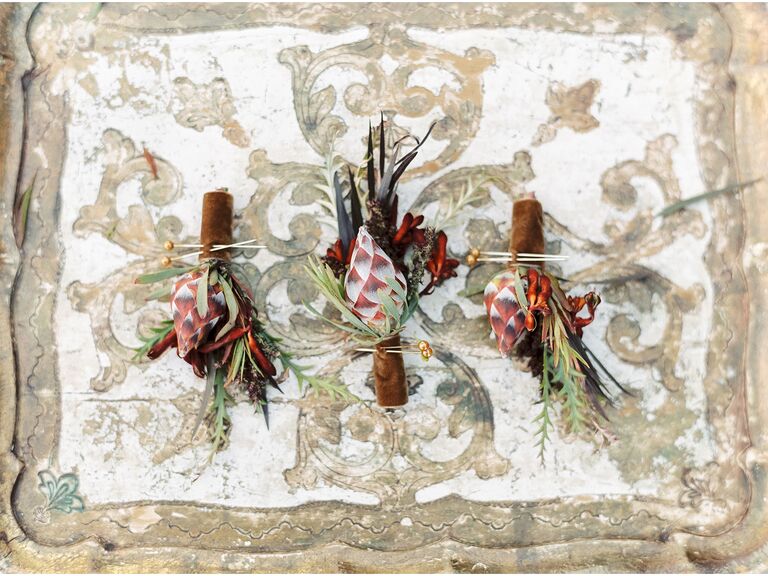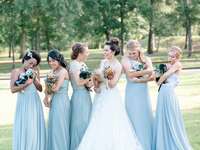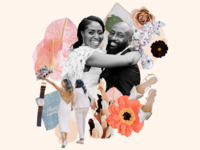Who Gets Wedding Corsages and Boutonnieres?
Wedding flowers aren't just there to make your big day pretty—they also hold great significance and symbolism. And just like on Valentine's Day or , when you give someone flowers at your wedding, it's a physical representation of your love and respect. Though they are indeed small, wedding corsages and boutonnieres are particularly important floral arrangements, as they are traditionally only presented to and worn by VIPs. You'll want to make a list of corsage and boutonniere recipients before your wedding day so your florist knows how many of these arrangements to make. So what exactly are wedding corsages and boutonnieres, and who gets them? We've got the rundown.
In this article:
- What Is a Boutonniere?
- Who Wears a Boutonniere at a Wedding?
- What Is a Corsage?
- Who Wears a Corsage at a Wedding?
What Is a Boutonniere?
A boutonniere is a small flower arrangement that is typically affixed to the wearer's clothing. Boutonniere means buttonhole in French because it is traditionally inserted into the buttonhole of a suit jacket's left lapel. Nowadays, it's more often pinned to the left lapel of a suit jacket or attached to one's shirt directly above their heart. Boutonnieres are typically given to the recipients before the wedding ceremony begins so they can be worn with pride during the processional.
White roses and calla lilies are the most popular blooms used in boutonnieres, but a variety of other flowers and greenery may be used, including orchids, ranunculuses, dahlias and more. We've even seen boutonnieres made of non-floral items, from Legos to peacock feathers, brooches—wherever your imagination takes you!
Who Wears a Boutonniere at a Wedding?
A boutonniere identifies a wedding attendee as an honored guest, so it's important to choose your boutonniere recipients wisely. Traditionally, boutonnieres are wore by those who identify as male, but anyone who is wearing a suit may wear one. Here's a list of those who typically wear a boutonniere at a wedding, but really, anything goes.
Note: Boutonnieres can be tricky to pin on, but your wedding planner, venue coordinator or floral designer can assist if you're having trouble.
Groom or Groom(s)
It should go without saying that the guest of honor traditionally wears a boutonniere. The groom or grooms may choose to a wear a boutonniere that's slightly different from the rest of the crew, or he may prefer everyone's arrangements to match.
Father of the Bride(s) and Father of the Groom(s)
Dear ol' dad definitely deserves a boutonniere! Father and child can help pin each other's boutonnieres on, which makes for a special and emotional photo op.
Stepfathers
Weddings can be tricky for stepparents, but presenting your stepdad with a boutonniere shows your appreciation for his role in your life.
Grandfathers
Having a grandparent present at your wedding is so special—and pinning a boutonniere to Grandpa's lapel is sure to bring a tear to everyone's eyes (make sure your photographer is nearby!).
Wedding Party Members
Groomsmen have traditionally worn boutonnieres, but nowadays, any wedding party members who would like to wear a boutonniere may do so. We recommend asking your wedding party members about their preference based on their attire.
Ring Bearers
Your littlest attendants certainly deserve a special flower arrangement. Make sure your florist knows how many ring bearers you're including and their ages so they can create a boutonniere that's just the right size.
Ushers or Greeters
By directing guests to their seats and answering questions before the ceremony, ushers serve an important role in the wedding day. Make sure they are properly identified by giving them boutonnieres. Ushers' boutonnieres may be slightly different from those given to wedding party members, but they can all be the same if preferred.
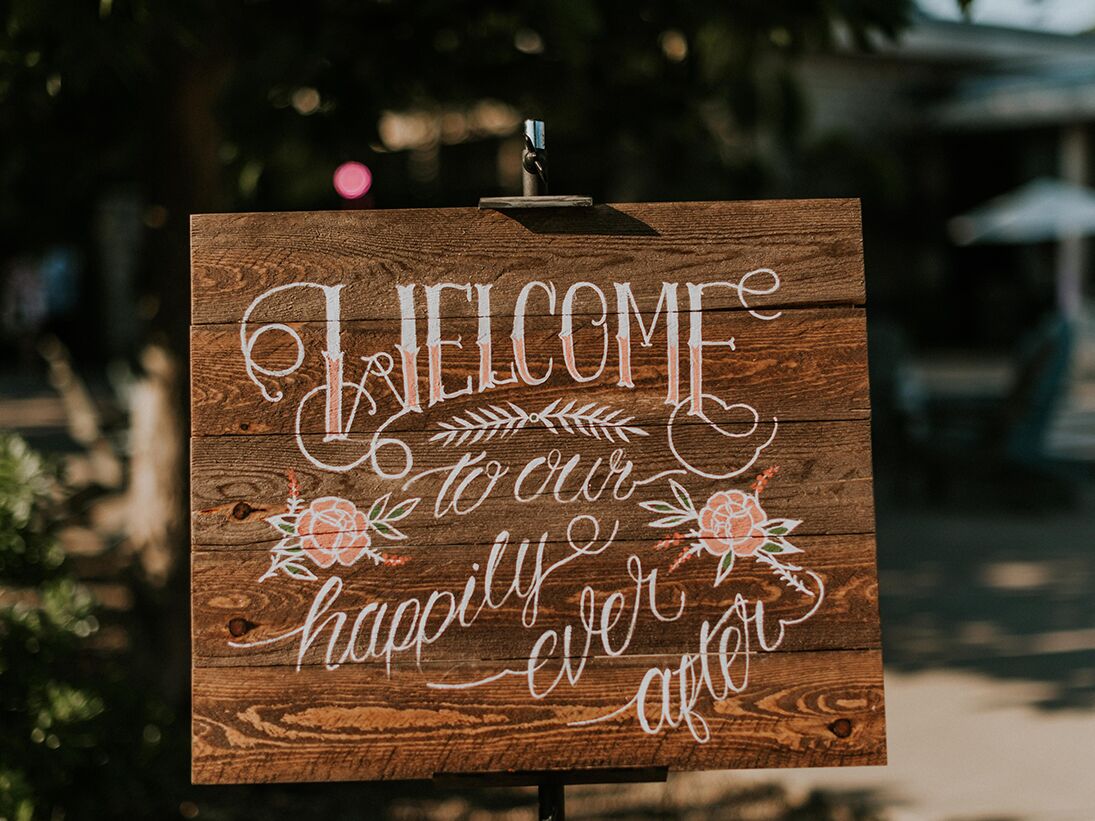

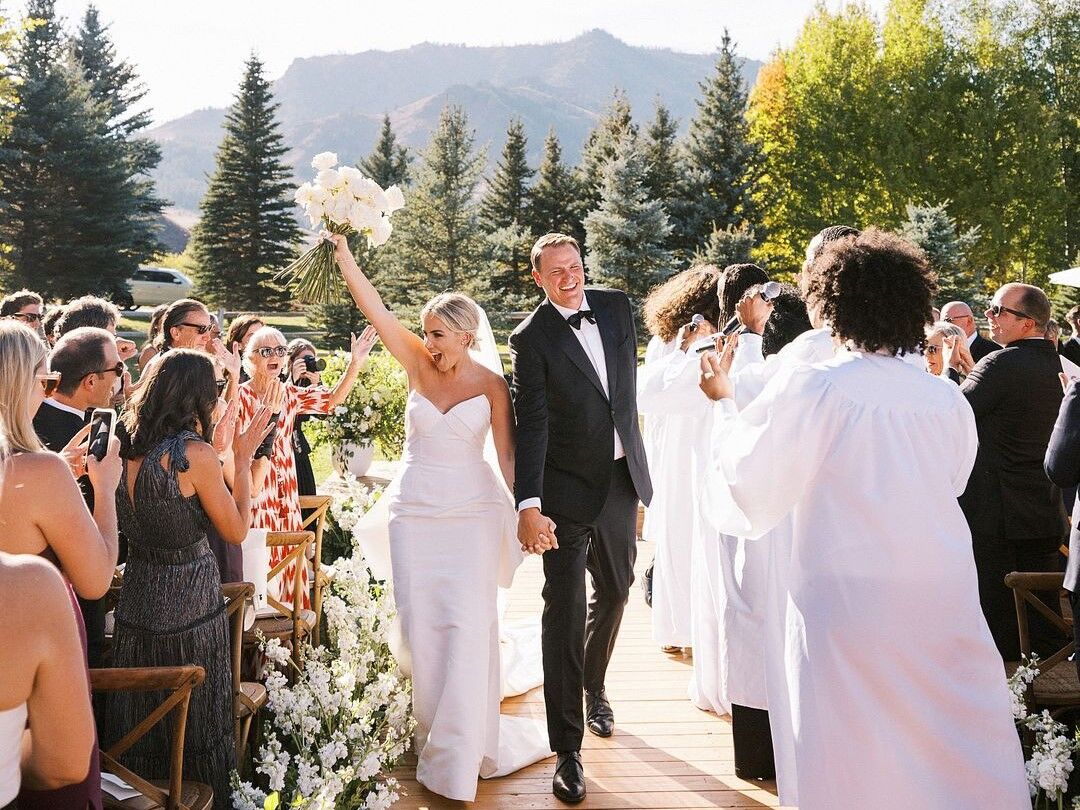
Officiant
Male officiants who are not wearing religious garb are typically offered boutonnieres to wear. Before the wedding day, ask your officiant if he would like to wear a boutonniere.
Other VIPs
If there are other loved ones whom you'd like to honor on the big day, feel free to give them a boutonniere. Whether it's a beloved family member or a close family friend, a boutonniere will identify them as a special guest. Those who are performing readings during the ceremony may also receive a boutonniere.
What Is a Corsage?
The word corsage means bodice of a dress in French, which is fitting because traditionally, a corsage is a small flower arrangement (sometimes just one flower) that is pinned to the bodice of a dress. These days, a corsage may also be tied to the wrist with a ribbon. A wrist corsage is preferred if the wearer's dressed is heavily beaded or delicate to avoid damage. Whether it's a wristband style or a pin, a flower corsage dresses up one's look and identifies them as an honored guest.
Traditionally, a corsage is worn by a female-identifying guest, but it's best to ask your loved ones if they prefer to wear a corsage or a boutonniere on the big day, as well as which style they'd feel most comfortable wearing. And of course, be sure to let your florist know how many corsages you'll need, and for whom.
Who Wears a Corsage at a Wedding?
While the bride typically carries a bridal bouquet, other important guests may wear a corsage on the big day. Here's a rundown of those who often wear corsages at a wedding.
Mother of the Bride(s) and Mother of the Groom(s)
While your mom will likely be beaming with pride on your wedding day, a corsage will make her feel extra special. Share a private moment with Mom (and a photographer) to give her her corsage and tell her how much she means to you.
Stepmothers
A corsage helps identify your or your partner's stepmom as an important person in your life. If possible, give your stepmom her corsage personally.
Grandmothers
Don't forget about Grandma! She'll be so touched to be presented with a corsage on the big day (keep those tissues handy!).
Wedding Party Members
While bridesmaids typically carry bouquets, you may also choose to give them corsages as a unique alternative. Other wedding party members, such as junior bridesmaids, flower girls or house party members, may also be given corsages. Talk to your florist to figure out the best floral arrangements for your entire crew.
Ushers or Greeters
Female ushers or greeters are traditionally given corsages to wear. Not only is this a nice gesture, it also identifies these people as "helpers" before and during the wedding ceremony.
Officiant
If your female officiant is not be wearing religious clothing, she should be offered a corsage to wear. Be sure to ask her if she would prefer a pin or wrist corsage in advance—many officiants use their hands a lot during the ceremony, so a wrist corsage may get in the way.
Other VIPs
Corsages may also be presented to other special loved ones who may not have roles in the wedding party. From your cousin who is giving a reading during the ceremony to your favorite aunt, a corsage will make them feel extra special and loved.
